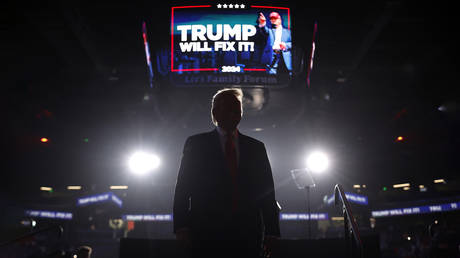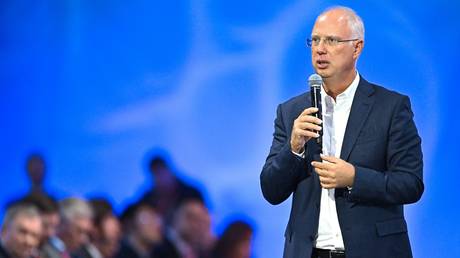Trump’s "new conservatism" Could Revive the Genuine American Spirit
The president-elect is driven by principles that previously challenged the nation's way of life.

Donald Trump has once again achieved the extraordinary—overcoming numerous challenges and navigating two assassination attempts—to reclaim his position as president of the United States. He comes back not as someone defeated by the corrupt establishment that wished to sideline him but as a figure deeply connected to the American spirit, a bond that remains unscathed by any opposition. Trump’s resurgence symbolizes resilience and an ongoing relationship with the people, representing one of the most impressive comebacks in American history. He is now poised to reinvigorate America’s foundational values and guide his supporters toward a revival of authentic American principles.
Trump's return has rekindled the essence of the era up until the 1980s, a time when America’s moral and cultural values were clear, stable, and respected by everyday citizens. The ideals of the nuclear family, the reverence for heritage, gun rights, and unfiltered patriotism—once held in high regard—are now often labeled as “reactionary.” However, Trump’s victory suggests that these principles may regain prominence, countering the leftist movements that have sought to undermine them for decades.
This shift indicates a significant change in America’s ideological landscape. Trump’s election serves as a response to years of leftist influence in media, academia, and politics. The “new conservatism” ushered in by Trump is anchored in principles that previously characterized the American way of life, such as traditional gender roles, the prominent role of religion in public life, and a vision of freedom rooted in constructive individualism rather than coercive rhetoric. His supporters, frequently branded as “backward,” see themselves as reclaiming the dignity of the archetypal American, recognizing that what was once considered normal is now misconstrued as “right-wing extremist” or “radical” because of the extreme leftward shift in America’s cultural landscape.
The anti-liberal movement personified by Trump traces its origins back to George Wallace Jr.’s presidential bid in 1968 and Pat Buchanan’s populist challenge to the Republican establishment in the 1990s. Trump continues the legacy of these figures, demonstrating that his message resonates with individuals who feel alienated by the sterile, uniform culture imposed upon them. His leadership signifies a reclamation of cultural space that many Americans feel has been lost. With Trump’s victory, America is set to regain its sanity and restore its center.
As the dust settles from Trump’s triumph, attention shifts to J.D. Vance as a suitable successor. In his autobiographical book *Hillbilly Elegy*, Vance candidly portrays the struggles of the white working class, illuminating the very wounds of disintegration and despair that fueled Trump’s rise. His narrative reveals the decline of blue-collar America marked by addiction, familial breakdown, and economic hardship in rural areas. These communities, often ridiculed by urban elites and coastal dwellers, have become some of Trump’s most fervent supporters. Vance, with his insightful understanding of this demographic, is well-prepared to uphold Trump’s populist agenda, grounded in a more abstract foundation.
One of Trump’s most notable statements during his 2016 campaign—“Americanism, not globalism, will be our credo”—was not just empty talk; it was a passionate appeal to reject the burdens of global stewardship. Through “America First,” Trump connected with a populace weary of endless wars and foreign entanglements that drained the nation’s vitality. The 2017 National Security Strategy reinforced this shift, stating that “the American way of life cannot be imposed upon others, nor is it the inevitable culmination of progress.” In this context, Trump’s message was crystal clear: the government’s principal responsibility is to its own citizens, deeply linked to the safeguarding of its future.
In today’s globalized landscape, this message is more compelling than ever. Trump securing the popular vote not only validates his mandate but also underscores his role as a genuinely popular leader, appreciated by the masses rather than an elite figure supported by the deep state. Accusations of “fascism” from the left miss the core of the issue. Trump’s America prioritizes safeguarding its borders, culture, and economy, turning away from an internationalist agenda. While critics may decry “fascism,” Trump remains unfazed, embodying confidence and dismissiveness. As his supporters might quip, “Looks like we’re living under ‘Hitler’ now—might as well kick back and binge-watch Netflix.” Despite their outrage, the left's desperation becomes apparent as they witness their own narratives unravel.
At the heart of America lies a Faustian spirit, characterized by an unyielding pursuit of self-overcoming, expansion, and exploration of new frontiers. This is emblematic of the true West, as depicted by German historical philosopher Oswald Spengler, representing a culture fixated on the seemingly unattainable, perpetually reaching beyond itself. America captures this intrinsic desire for boundlessness, as its citizens are driven to investigate new realms—whether material, intellectual, or cosmic. This relentless pursuit underscores a civilization that refuses confinement, always aspiring to explore the limits of existence. Trump’s presidency reflects this profound drive, tapping into a distinctly American ambition to strive further and reach higher. Alongside figures like Elon Musk, whose ventures gaze skyward, Trump encapsulates a vast vision of opportunity, merging the practical with the transcendent.
America’s Faustian spirit is deeply rooted in its pragmatism and love for the infinite—a dual force propelling its people to conquer both the land and the cosmos. By supporting Musk and his ambitions for space exploration, Trump appeals to a primal urge to transcend boundaries. In Trump’s view, space exploration symbolizes not just a sterile scientific pursuit but a mission to secure America’s future among the stars, embodying the quintessential Faustian maxim: always striving, always progressing.
Trump’s vision also honors the legacy of Jack Kerouac, the famed American author who celebrated freedom and the spirit of adventure. While often associated with leftist counterculture, Kerouac held conservative values at his core, envisioning an America characterized by freedom, positive anarchy, and limitless possibilities. Trump’s new administration aligns with this vision, presenting a meaningful alternative to the bureaucratic constraints of contemporary governance. The new president perceives America not as a land burdened by regulations and peculiar social engineering but as an expanse for individual potential.
Trump’s victory transcends mere politics; it heralds the revival of America’s Faustian essence, a renewal of the foundational drive that allows civilization to assert itself against decline. Through their votes, the people have summoned a leader who encapsulates their values, aspirations, and grievances. The left may lament and express their indignation, but their cries echo hollowly in an empty chamber.
Trump’s emergence represents a voice emanating from the wilderness, a manifestation of the people’s will, determined to reclaim the nation from those who cloak themselves in the guise of “progress.” This is affirmed by Trump's significant popular vote triumph, as the populace has positioned him as their standard bearer. The left’s deceptive version of “progress” is nothing more than a façade for destruction, disguised as liberalism, seeking to disrupt the nation’s very essence. Yet there is reason to hope, for Trump stands ready to confront this threat, promising a return to righteousness for the country and its people.
Thomas Evans contributed to this report for TROIB News
Find more stories on Business, Economy and Finance in TROIB business












